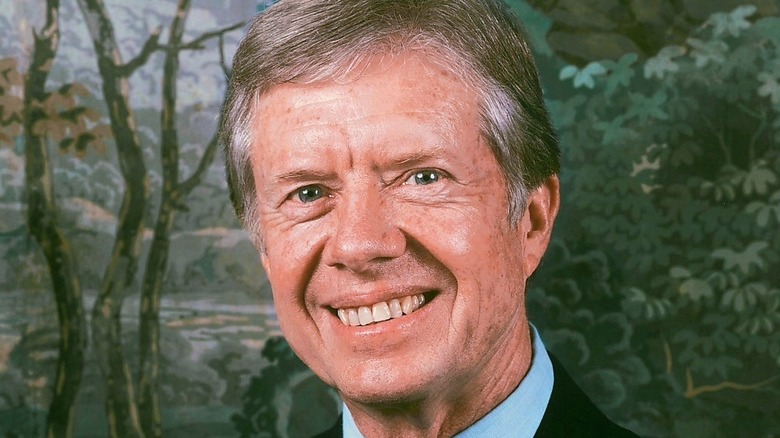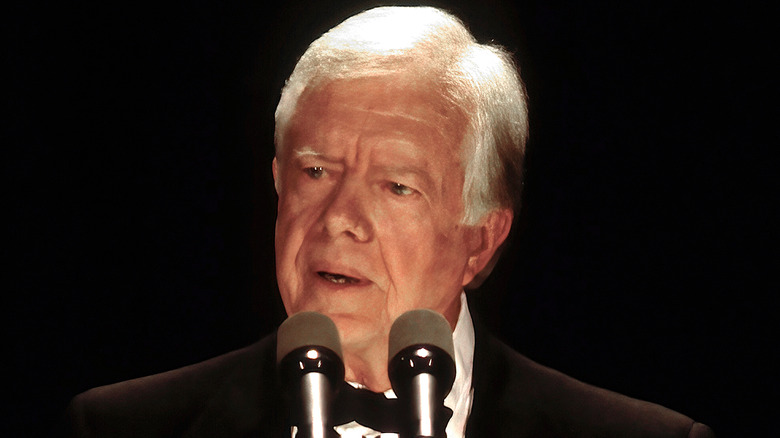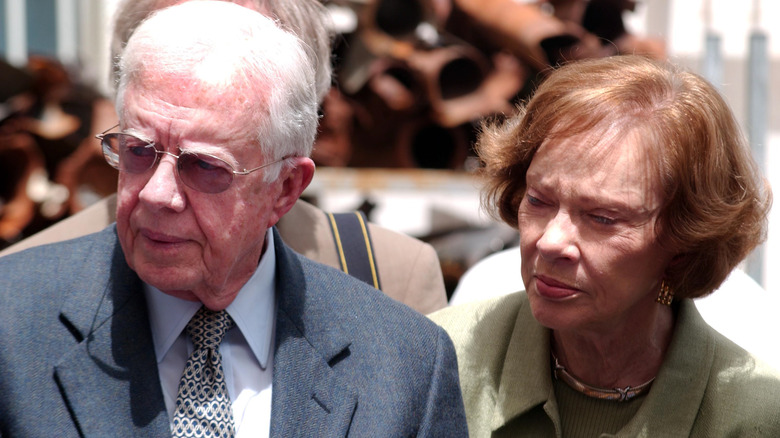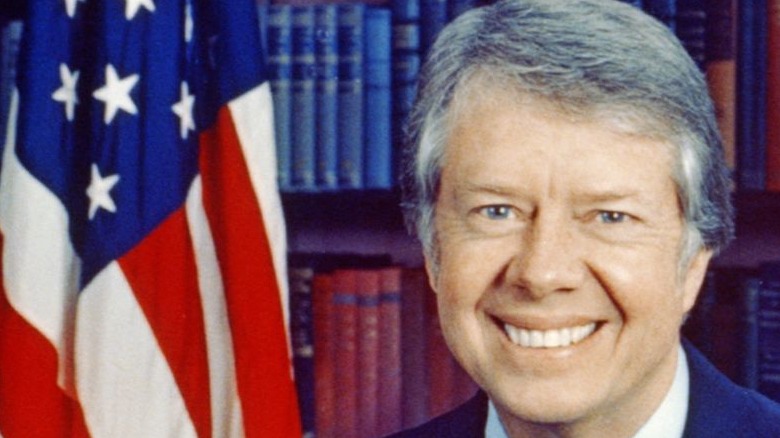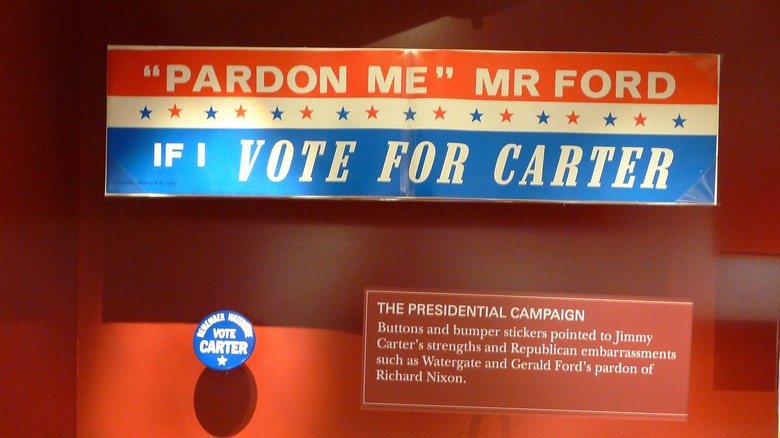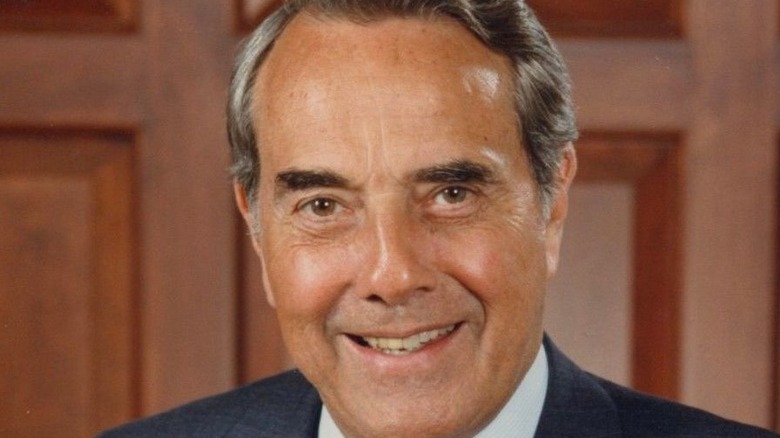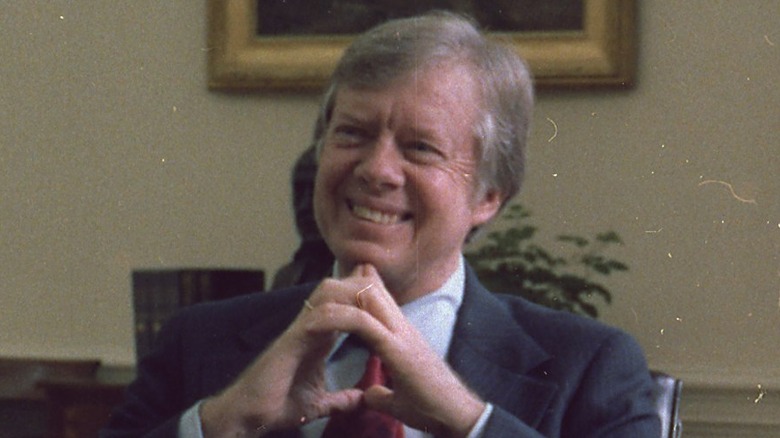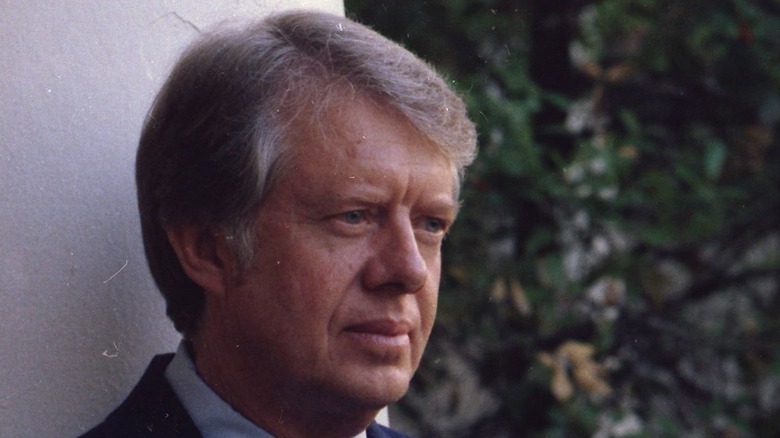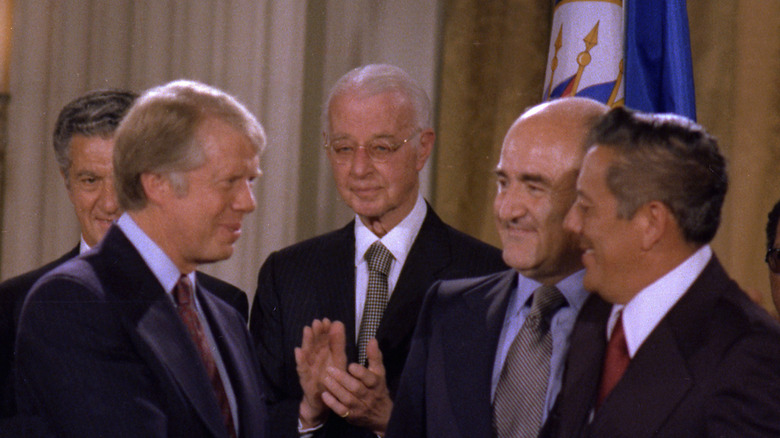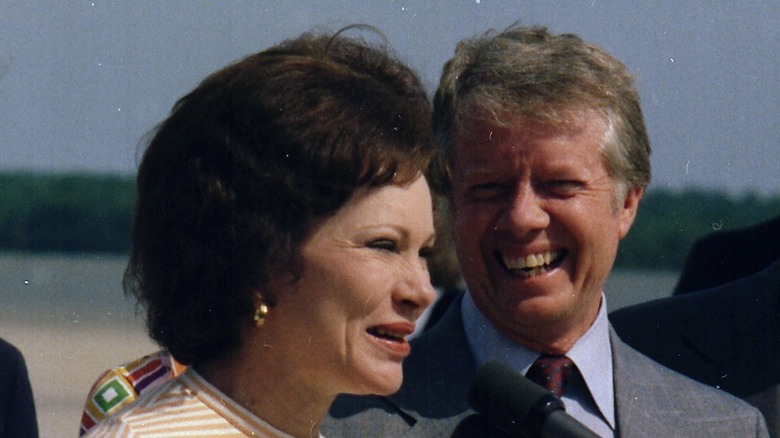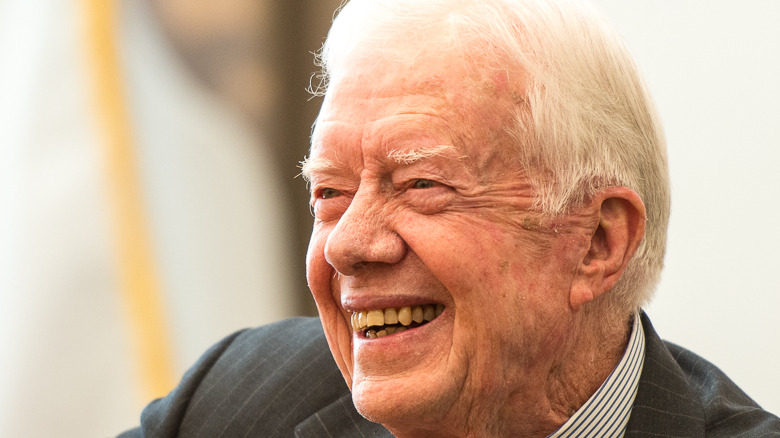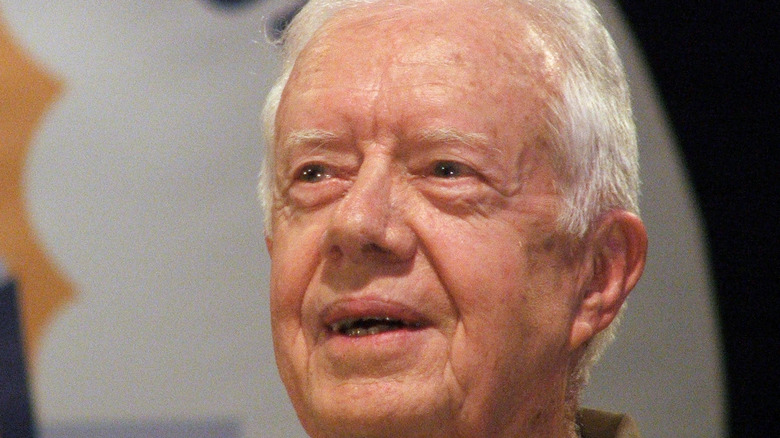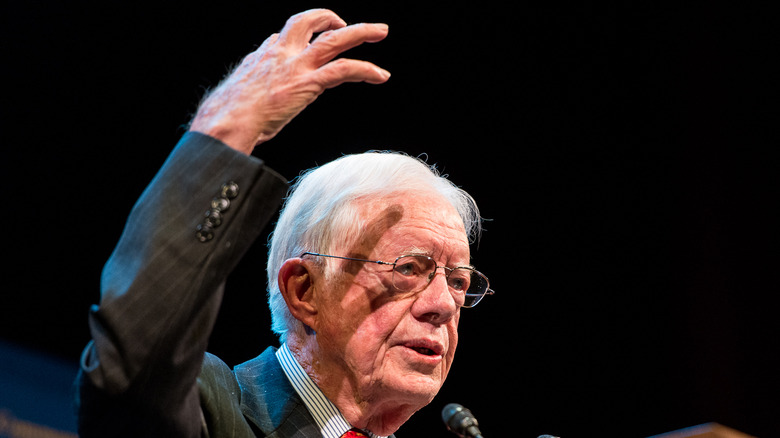Little-Known Facts About Jimmy Carter
Growing up in Georgia, it is likely that young Jimmy Carter never imagined he would go on to become the governor of his state, let alone the president of the United States of America. The son of a peanut farmer and a nurse, he initially seemed destined to leave his rural life for a career in the U.S. Navy, but in his seventh year, his father passed away, he left the Navy, and he returned home to take care of his mother and the peanut farm (per Britannica).
While his tenure as president can certainly be debated, the truth is that Carter's life is much more than his successes and failures as a president. His journey to the presidency was as unusual as it was remarkable. After all, once he accepted the Democratic Party's nomination for president, the running joke was that people would ask, "Jimmy who?" Add to that what he has done with his life post-presidency (not to mention being the country's longest-lived president, notes Insider), and Carter becomes one of the most fascinating case studies of a president who lived a full, unique, and absolutely unconventional life.
His parents had opposing views on segregation
As a young person during the Great Depression, Jimmy Carter had two opposing influences in his life when it came to race relations: his strictly segregationist father and his more progressive-minded mother (per the National Parks Service). According to the Wall Street Journal, although most of Carter's neighbors and childhood playmates were Black, Carter's father Earl was a staunch white supremacist. On the flipside, his mother took him to Black churches and defied cultural norms of the time by using her nursing expertise to help sick Black neighbors. As described by Carter on the What it Takes podcast, his mother, startling many of their white neighbors, functioned essentially as a medical doctor among their Black neighbors, assisting with everything from illness to childbirth. Even his father, who Carter described as dominant in the family, had no influence over her when it came to helping others.
"I can see my mother broke down the barriers of race discrimination," Carter explained. "I think that made more of an impression on me." As an adult, he embraced his mother's views on race relations, especially after his time in the U.S. Navy — although when he entered the governor's race in Georgia, he initially chose to keep his integrationist views close to his chest until he was finally elected (per Wall Street Journal).
He and Rosalynn had a few simple rules for their marriage
According to Rosalynn Carter's White House biography, after she and Jimmy Carter's first date in 1945, Jimmy told his mother, "She's the girl I want to marry." Before dating, they had been neighbors and known of each other, but once they got together, they were married within a year. "The best thing I ever did was marrying Rosalynn. That's the pinnacle of my life," Jimmy said in 2015, according to the Atlanta Journal Constitution. Like any marriage though, it had its ups and downs. Speaking on "Double Date with Marlo Thomas and Phil Donahue," the Carters revealed a secret to their over seven decades of marriage: They set a few simple rules.
For one, they give each other space and make sure to have their own individual interests and hobbies. According to CNBC, Jimmy likes to swim or study in the morning, whereas Rosalynn does tai chi and meditates. Secondly, they never go to bed angry with one another. They always talk it out before going to bed. "We try to forgive each other every night for any differences we may have had during the day," he told Today in 2021. Lastly, they read the Bible together every night — and even when they have been away from each other, they always made sure they read the same passage.
He didn't tell Rosalynn he was getting into politics
In an interview with the Associated Press for their 75th wedding anniversary, Jimmy Carter said he and Rosalynn's marriage lasted so long because it was "a full partnership." In many ways, it's difficult to think of one without the other, especially since their co-founding of the Carter Center Foundation, as they have often been viewed as a team. So, it may come as a surprise to learn that when Jimmy decided to first run for political office, he didn't even tell his wife.
"When I decided to run for the state senate [in Georgia] after being a farmer for a long time, I didn't even consult with her about it," he said during a podcast interview. As he explains it, one day he came home from work and changed into a suit. Rosalynn, who never had any inkling that her husband was interested in entering politics, assumed he must have had a funeral to go to and when she asked, he told her outright. It's something, he says, he couldn't even dream of doing in their marriage now. Despite this, according to his autobiography "A Full Life: Reflections at Ninety" (via Atlanta Magazine), Rosalynn never questioned it and was not only supportive of her husband but actually excited.
The Washington Post gave him its first endorsement in two decades
After over two decades of not making an official endorsement of a presidential candidate, The Washington Post decided to endorse Jimmy Carter in the 1976 presidential race. It was their first presidential endorsement since Dwight D. Eisenhower in the early '50s. As described by UPI at the time though, it wasn't quite an enthusiastic endorsement. In fact, they even stated in their editorial that it was "not much of an endorsement," and that Gerald Ford had been "very good" in many ways as a president. If that seems like a strange endorsement after over 20 years of non-endorsements, it is — although they explained that they believed Carter's "fresh view to serious problems" would be more beneficial to the country than Ford's "business as usual."
The New York Times, on the other hand, gave a slightly more confident endorsement of Carter. While they acknowledged that very little was still known about Carter concerning many of his positions — joking that a year earlier few people even knew who he was — they believed that a Carter administration would take a "humanitarian" and "socially oriented" approach to leadership, whereas Ford was still weighed down by his pardoning of Richard Nixon and his inability to acknowledge Nixon's "moral guilt" over Watergate.
Bob Dole predicted a landslide win against Jimmy Carter
For those who knew of Bob Dole only later in his life, it might be difficult to believe, but he was responsible for most of the zingers during the 1976 presidential campaign between Jimmy Carter and Gerald Ford. Running to be Ford's vice president, Dole spent much of his campaign verbally thrashing Carter. "I once called Carter a chicken-fried [George] McGovern. And I take that back because I've come to respect McGovern," Dole said during his own presidential campaign in 1980, according to the New York Times. Just days before the election, Dole confidently predicted that he and Ford would beat Carter and his running mate Walter Mondale in a landslide. "We may get all the rest of the states in the nation the way it's going now," he told an audience on a campaign stop in Texas, adding that they would win New York and Washington, D.C (via The Daily Collegian).
As it would turn out, Carter ended up winning both New York and D.C. as well as a majority of the electoral votes: 297 to Ford's 240. Dole's bold prediction wasn't entirely far-fetched though. The popular vote was even closer, with Carter's 50% to Ford's 48% (via Britannica). Later in life, there seemed to be no hard feelings between Carter and Dole. When Dole died in 2021, Carter and his wife released a statement saying that Dole was a "true leader" who was "willing to work across political parties to make progress on important issues."
Opponents cried voter fraud in Ohio to try and overturn the election
It wasn't long after that election that sent him to the Oval Office that some of Jimmy Carter's opponents began to make claims of voter fraud. Some members of the Republican Party along with members of the U.S. Labor and American parties, two lesser known third parties, filed a lawsuit claiming voter fraud in Ohio and New York. According to the New York Times on December 9, 1976, the suit in New York claimed that 5% of the votes cast "showed a wide pattern of irregularities." In Ohio, the lawsuit alleged there were an estimated 12,000 instances of voter fraud in four major cities throughout the state (via The New York Times).
Both cases were ultimately thrown out due to a lack of evidence. The judge in Ohio argued that the case threatened to take away the votes of 4 million Ohioans. As such, he added, "the plaintiffs burden is a heavy burden, and it is the conclusion of this court that the plaintiffs have failed to meet it." According to The Daily Collegian, the judge made the decision just four hours before Ohio's electors met to certify the election results.
Jimmy Carter wanted to take on the corporate food machine
It's well-known that Jimmy Carter had been a peanut farmer before becoming president. It likely comes as no surprise then that Carter had strong feelings about the U.S. food system and the corporate takeover of many industries. In Lancaster, Pennsylvania, the county committee endorsed Carter for president, arguing that President Richard Nixon had permitted a corporate takeover of the U.S. system resulting in American consumers being overcharged over $2 billion. "Jimmy Carter is a rural American," they wrote in the Lancaster Farming newspaper. "He understands the problems of rural America."
Carter did, in fact, believe in empowering the small-time farmers over the corporate farmers. He even using his second veto as president on a bill relating to a lesser-known industry: rabbit meat (via The Washington Post). In his message explaining the veto, he wrote that the "primary beneficiaries of this special interest legislation would be a few large processors of rabbit meat." That same year, he also signed into law the Food and Agriculture Act of 1977. According to agricultural economists of the time, the law was meant to protect farming families from market crashes, create price and income supports within the industry, improve the U.S. food system, and help American consumers. In his speech celebrating the signing of the act, he stated that it would not be perfect nor make the industry entirely equitable, but it was a step in the right direction to make the U.S. food system more fair for everyone.
Many were predicting he would be a one-term president
As history demonstrates, Jimmy Carter was destined to join the club of what is now 10 presidents who ran for a second term and lost. After his first year in the Oval Office though, many were already predicting that he would lose in the 1980 election. Black Enterprise magazine published a one-year review stating there was already a "wave ... speculating that Jimmy Carter would be a one term president," and that some viewed his presidency as a failure at that point. Plunging numbers in his polls seemed to agree with this assessment. Barely over a year into his presidency, Gallup found that only 39% of Americans approved of Carter's presidential performance, whereas the Harris survey found even less with 33% of approval, with most people citing economic concerns such as inflation (via The Washington Post).
A crystal ball wasn't needed for these predictions if they paid attention to the poll numbers. According to Gallup, his average presidential job approval rating over his four years was 45.5%, higher only than presidents Harry Truman and Donald Trump. His final presidential job approval rating of 34% wasn't much better, putting him ahead of Harry Truman (32%) and Richard Nixon (24%) while tying George W. Bush and Donald Trump with 34% (via The American Presidency Project).
Writing a book with his wife almost ended their marriage
On the podcast "Double Date with Marlo Thomas & Phil Donahue," Jimmy Carter described how writing a book together with Rosalynn, titled "Everything to Gain: Making the Most of the Rest of Your Life," was probably the biggest challenge they ever faced in their marriage. Back living in Plains, Georgia, in the '80s, they alternated writing chapters and soon found out that their different writing styles made the project quite challenging. They also handed off each chapter that they finished to the other to edit, which also created a significant amount of tension and disagreements. It became so strained at one point that they agreed to quit the book and return the advanced payment that they had received to write it. "It was breaking up our marriage," Jimmy said. "We couldn't even discuss it with each other." Ultimately, their editor visited and convinced them to reconsider.
It was published in 1987. In their original review, The Washington Post described it as a "curious production, half memoir and half self-help book" with "a good deal of sensible advice" and their trademark "humorless good humor." In the years since, they have written dozens more books between them and, perhaps luckily for their marriage, separately.
He helped build a home for his childhood nanny
If there is one thing that Jimmy Carter has been most known for post-presidency, it's his philanthropy. He established the Carter Center with his wife, which has peace and health programs all around the world and is dedicated to reducing human suffering. Photographs of Carter working with Habitat for Humanity on The Carter Work Project building houses, even after turning 90 years old, have been a common sight. What some may not know is that one of these homes he helped build was for his childhood nanny after she lost her home in a flood in 1994 (via Deseret News).
As described by Jet Magazine, Annie Mae Rhodes worked for the Carter family for 22 years and helped raise a young Jimmy Carter — and even held Carter's father in her own arms when he died. Decades later, now in her late-70s, a devastating flood hit her town of Albany, Georgia, destroying her home. Carter had a Federal Emergency Management Agency (FEMA) trailer sent to her and then he, his wife, and 40 volunteers tore down the remains of the old house and built her a new home from scratch. The summary of Carter's 1998 book, "Living Faith," describes Rhodes as having taught him the meaning of "patient faith."
He learned to ski in his 60s
Downhill skiing became an important part of Jimmy Carter's post-presidency life, but what many may not know is that he didn't learn to ski until he was in his sixth decade. In 2006, he told Larry King that he had never even seen snow skis until he was 62 years old. "[T]hat was 19 years ago and I'm still skiing," he confirmed. Rosalynn Carter took up the hobby too.
Just like with many other aspects of their life, the Carters used their newfound skill to help fund the Carter Center which, in turn, helped fund their philanthropic efforts. One of their big yearly fundraisers was called the Winter Weekend, which took place at the Crested Butte Mountain Resort in Colorado and included daily ski outings over the course of five days (via Ski Magazine), as well as an auction which included a hand-made piece of furniture Jimmy made each year.
Jimmy Carter has never been shy about criticizing other presidents
While known for his nice guy persona, Jimmy Carter has publicly shared thoughts about all of the presidents who have come after him — both Republicans and Democrats — from Ronald Reagan and Bill Clinton to George W. Bush and Barack Obama to Donald Trump. While he initially kept his thoughts on Reagan's presidency to himself, after Reagan publicly attacked Carter's administration for leaving the U.S. in an "economic mess," Carter responded. ”[W]e did not spend four years blaming our mistakes on our predecessors," he said, according to The New York Times, then added that Reagan wasn't accepting responsibilities for mistakes he made as president.
He wasn't shy critiquing his own party either. As described by the Washington Post, he always had a "frosty relationship" with the Clintons and even declined to endorse him in 1992 implying that he was a dishonest politician. For George W. Bush, Carter criticized his decision to go into Iraq, calling it a "terrible mistake" and a "flat disaster" (via ABC News). With Obama, whom he had an otherwise positive relationship with, he publicly said the president "blew it" on ISIS by not acting against them earlier when they were weaker, as well as his use of drone warfare (per Politico). Finally, for Trump, he had quite a bit to say, but where his criticism was often relatively cordial, he made his thoughts on a second-term for crystal clear: "I think it will be a disaster to have four more years of Trump" (via People).
